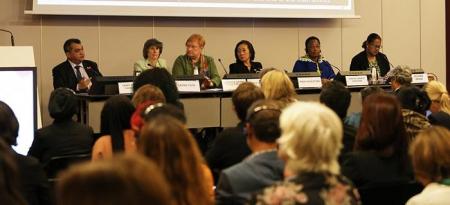
(L-R): Saber Hossain, Member of Parliament, Bangladesh; Laura Tuck, Vice President for Sustainable Development, World Bank; Tarja Halonen, former President of Finland; Mami Mizutori, SRSG for DRR; Minata Samate Cessouma, Commissioner for Political Affairs, African Union; and Dolores Devesi, OXFAM, Solomon Islands
By Omar H. Amach
GENEVA, 16 May 2019 - The large-scale drop in disaster mortality in Bangladesh in recent times was due to a deliberate policy of promoting women's leadership in all sectors, a Special Session on Women Leadership was told yesterday at the Global Platform for Disaster Risk Reduction.
Saber Hossain Chowdhury, a Member of Parliament in Bangladesh, credited the reduction in disaster mortality to promoting women leadership and empowerment in all sectors - a move that he says helped propel Bangladesh’s ascension from a low income to middle income country:
“Whether it is the reduction of poverty, child mortality, or primary education, when looking at women’s empowerment, it can’t be selective. There has to be a whole of society approach,” said Mr. Chowdhury
Bangladesh has made its cyclone preparedness programme more inclusive of women. Women are involved in the design of early warning systems, the building of cyclone shelters, and in raising community awareness. This has managed to lower the ratio of female to male deaths by almost two-thirds.
When disaster strikes, women are disproportionately impacted compared to men. In April 1991, when Bangladesh was hit by a powerful cyclone, 90% of those killed were women, and four times more women were killed in India, Sri Lanka, and Indonesia by the 2004 Indian Ocean tsunami than men. In Europe, more women died as a result of the 2003 heatwave than men.
The central message of the Special Session was that committing to a strong focus on gender in disaster risk reduction, ensuring women’s leadership at all levels and recognizing their contribution to disaster risk governance is critical to achieving the ambitious targets set out in the Sendai Framework.